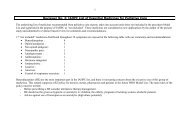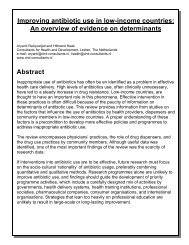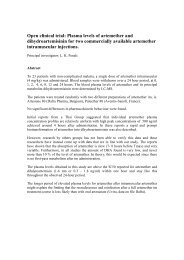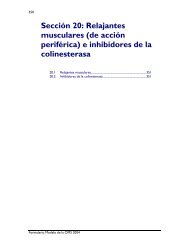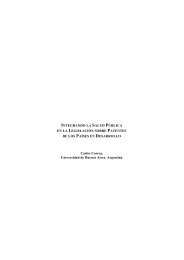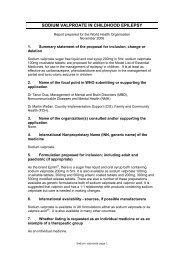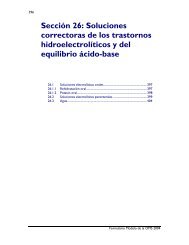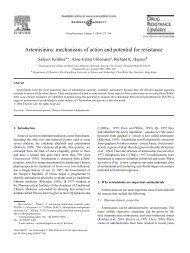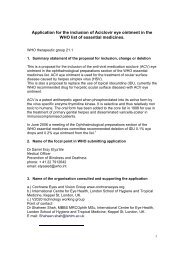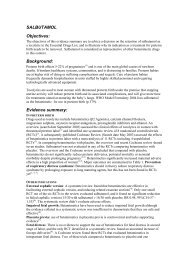Artesunate + mefloquine fixed-dose combination
Artesunate + mefloquine fixed-dose combination
Artesunate + mefloquine fixed-dose combination
Create successful ePaper yourself
Turn your PDF publications into a flip-book with our unique Google optimized e-Paper software.
6.2 Manufacturer of the finished product:<br />
The <strong>fixed</strong> <strong>dose</strong> <strong>combination</strong> of <strong>Artesunate</strong>/ Mefloquine HCl is manufactured by Mepha Ltd. in its<br />
manufacturing plant:<br />
Dornacherstrasse 114<br />
4147 Aesch<br />
Switzerland<br />
The manufacturer is certified as GMP compliant by its local authorities.<br />
A WHO inspection was also carried out from 25 to 27 April 2005 and the manufacturer was compliant<br />
with the principles and guidelines of WHO Good Manufacturing Practices.<br />
7. Whether listing is requested as an individual medicine or as an example of a therapeutic<br />
group<br />
<strong>Artesunate</strong> / Mefloquine <strong>fixed</strong>-<strong>dose</strong> <strong>combination</strong> (Artequin Paediatric Stickpacks containing 50 mg<br />
artesunate and 125 mg <strong>mefloquine</strong> each) should be listed in the WHO essential drug list within the<br />
pharmacotherapeutic group “antimalarial medicines for curative treatment”.<br />
8. Information supporting the public health relevance (epidemiological information on disease<br />
burden, assessment of current use, target population)<br />
Malaria is the most important of all tropical diseases and despite considerable efforts to eradicate or<br />
control the disease, malaria continues to be a major cause of human morbidity and mortality in the<br />
tropics, particularly in Africa and South-East Asia. Worldwide prevalence of the disease is estimated to<br />
be in the order of 300-500 million clinical cases each year and more than 90% of all malaria cases are<br />
in sub-Saharan Africa.<br />
In fact, out of more than 1 million deaths due to malaria in endemic regions each year, more than 80%<br />
occur in Africa south of the Sahara and over 75% occur in African children under 5 years infected with<br />
Plasmodium falciparum. About 1 in 5 (approx. 18%) of all childhood deaths in African is due to malaria<br />
resulting in one child’s death due to malaria every 30 seconds. In addition, an even greater proportion<br />
of child deaths is indirectly related to malaria: malaria infections contribute to the development of<br />
severe anaemia and make young children more susceptible to severe outcomes of common illnesses<br />
such as diarrhoea and respiratory diseases.<br />
Treatment of Plasmodium falciparum malaria in Africa is increasingly difficult. Resistance to cheap<br />
efficient antimalarial drugs poses an increasing threat.This is especially worrying in West Africa, where<br />
many health services depend on chloroquine as the first-line treatment of uncomplicated malaria,<br />
despite chloroquine resistance becoming more common.<br />
WHO, on the advice of international experts, recommends the introduction of <strong>combination</strong>s of drugs to<br />
replace single drugs in the treatment of Plasmodium falciparum malaria. WHO recommends in<br />
particular the use of drug <strong>combination</strong>s containing the peroxidic antimalarial artemisinin (derived from<br />
the herb Artemisia annua) and its derivatives such as artesunate, i.e., artemisinin-based <strong>combination</strong><br />
therapies (ACT), which provide an immediate solution to the problem of drug resistance.<br />
These recommendations led to the selection of two highly potent ACT partner drugs, namely<br />
artesunate and <strong>mefloquine</strong>, as active ingredients of Artequin Co-blister tablets as well as the <strong>fixed</strong><strong>dose</strong><br />
<strong>combination</strong> (FDC) of Artequin Paediatric Stickpacks.<br />
9. Treatment details (dosage regimen, duration; reference to existing WHO and other clinical<br />
guidelines; need for special diagnostic or treatment facilities and skills)<br />
Posology and method of administration:<br />
Patients with a body weight between 10 and 20 kg<br />
A treatment course with Artequin Paediatric comprises 3 stickpacks, each containing 50 mg<br />
artesunate and 125 mg <strong>mefloquine</strong>. One stickpack is to be taken once daily for 3 consecutive days.<br />
<strong>Artesunate</strong>/Mefloquine Hcl, Fixed <strong>dose</strong> <strong>combination</strong> 3/14



